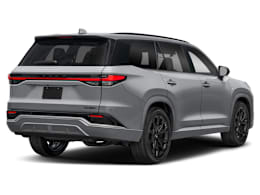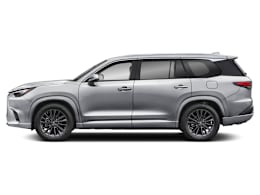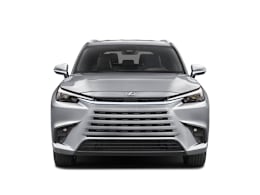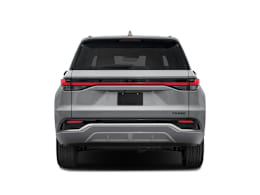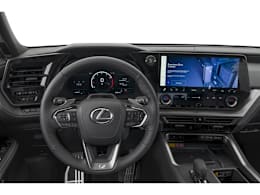Lexus has expanded its SUV line with the all-new TX, a three-row model that shares its dimensions and many mechanical bits with the new Toyota Grand Highlander, although the Lexus is more plush and luxurious. All-wheel drive is standard. The TX takes over for the previous RX L, which didn’t offer a truly functional third row. This new Lexus benefits from a boxy shape and added length over the latest RX, enabling spacious accommodations for all three rows, along with tremendous cargo-toting abilities when the third row is folded down.
The TX is essentially a Grand Highlander that went to finishing school, being more cultured and better mannered. It’s quieter and more refined, with a nicer interior. Of note: We tested both the TX500h F Sport hybrid and standard TX350, and the hybrid outscored the regular version by quite a large margin. The TX500h gained this advantage due to its better fuel economy, quicker acceleration, and more agile handling. And even though the TX500h is the sportier of the two, testers praised its well-controlled ride that wasn't compromised to gain its handling prowess edge over the more mainstream TX. We also really liked the TX500h's interior attention to detail; it's a very classy cabin.
In fact, the TX500h not only handily outclasses the TX350, but also outscores even the cream of the crop in this competitive luxury three-row SUV field, including the Audi Q7, BMW X7, and Infiniti QX60. One tester went so far as to say “This is a very different type of Lexus: Taut and agile with a mildly sporty flavor instead of feeling like a 1972 Buick. That’s a welcome move.”
We bought a Lexus TX500h F Sport hybrid—anonymously from an area dealer, as we do with every vehicle we test—for the purpose of this road test review.
The TX is the first Lexus to be manufactured at Toyota’s assembly plant in Indiana.
Driving experience
The TX500h’s 366-horsepower, 2.4-liter turbocharged four-cylinder engine with electric drive is a delight, supplying lots of power at nearly any rpm. Most drivers were awed by the immediate and smooth acceleration and couldn’t believe this Lexus only has a four-cylinder engine.
There’s a satisfyingly smooth integration of the engine’s power, the hybrid’s electric boost, and the responsive six-speed automatic transmission, which together deliver the goods at any throttle position, terrain or speed. It returned a brisk 6.3-second 0-to-60 mph dash, which is a second quicker than the Acura MDX, more than half a second quicker than the Audi Q7 3.0T, and almost two seconds quicker than the conventional TX350.
In terms of fuel economy, we measured 24 mpg overall on premium fuel—a good showing for a three-row SUV, beating competing models that all hover around 20 mpg. It’s also better than the TX350, which returned 21 overall mpg in our tests.
The TX500h feels relatively agile for such a big SUV, and it’s sharper going through corners than the Grand Highlander upon which it’s based. The steering is nicely weighted and body roll stays controlled during regular driving. It even feels spirited when the road turns twisty, or when we drove it hard on our track. It acquitted itself well in all of our at-the-limit handling tests, proving stable, balanced and forgiving. Compared to the TX350, the TX500h F Sport has different tuning with a driver-adjustable adaptive suspension system, plus it benefits from dynamic rear steering that causes the rear wheels to turn slightly in the direction of the front wheels in high-speed situations to sharpen the handling. At low speeds, the rear wheels turn opposite the front wheels to help with parking maneuvers. In our initial experience, the effect was subtle but appreciated.
The suspension does a commendable job making the ride feel comfortable most of the time, though it falls short of being plush. Partly due to the large 22-inch tires our tested model was equipped with, there are times that some road imperfections punch through in a more pronounced way than you might expect. In terms of cabin noise, the TX500h—especially when the hybrid electric system is propelling the SUV—can be as hushed as a library. Some wind noise creeps in on the highway; we were pretty impressed with the quiet, cultured nature of the gas engine, which isn’t always the case with turbocharged four-cylinders.
Cabin comfort
The TX500h’s cabin is a nice place to spend several hours—either as the driver or a passenger. It has lots of padded areas, contrasting stitching on the door and center armrests, microsuede bits on the doors and dash, nicely-lined bins, and tight panel gaps. It’s a notch above the Grand Highlander, but it’s not quite up to the level of an Audi Q7 in terms of the quality of the materials or the presentation.
The TX500h F Sport’s front seats have pronounced side bolsters that hug you, but could be too narrow for some. They form a snug pocket between the bottom cushion and seatback, and hold you in place well through corners. There’s generous headroom along with well-cushioned armrests, and the sides of the wide center console are also padded slightly, though that area can still hem in the driver’s right knee.
Second-row passengers are treated to tons of space, with plenty of headroom and the ability to tuck your feet under the front seats, plus good knee room. The seatback and lower cushions are plush and nicely contoured, offering good overall support. There’s more space in the third row than in most midsized models, with enough room for average-sized adults—not a given in this class. Still, it’s not really comfortable, as the bottom cushion is situated low to the floor and delivers hardly any under-leg support.
Controls and usability
The 14-inch infotainment touchscreen is easy to use, and its generous size helps with readability and for making selections while driving. But we don’t love that this setup consolidates media and climate controls into a single screen, or that some relatively simple tasks require multiple steps. As we’ve seen in other Lexus models, the TX’s stubby electronic gear selector is odd to learn and annoying to use, with a confusing pathway and diagram for how to shift between Reverse and Drive. And, the electronic interior door buttons respond slowly and will be difficult to find for new passengers.
Safety
Standard active safety and driver assistance features include automatic emergency braking with pedestrian, bicyclist, and motorcycle detection, along with automatic emergency braking that operates at highway speeds, blind spot warning, rear cross traffic warning, reverse automatic emergency braking, lane centering assistance, lane departure warning, lane keeping assistance, adaptive cruise control, and automatic high beams.





